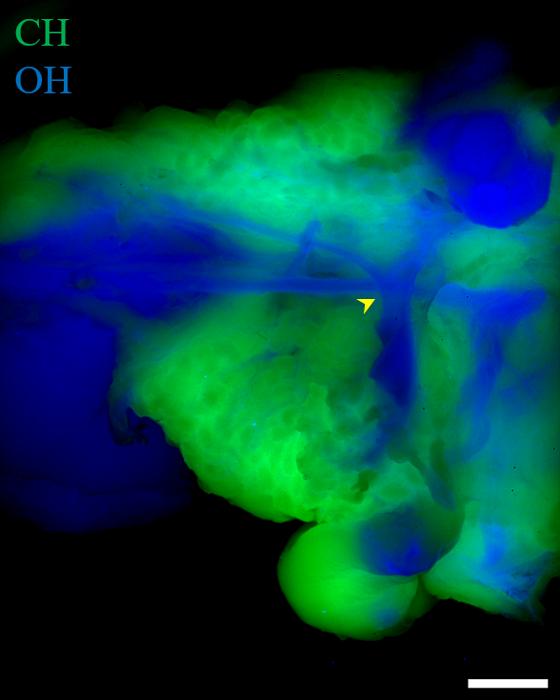The imaging techniques currently used in biological research cannot penetrate into deeper tissue layers. In cancer treatment, this means that remnants of tumors or individual cancer cells at tumor margins and in lymph nodes are not visible. Doctors performing surgery are therefore repeatedly faced with the difficult question of whether all of the affected tissue has actually been removed. For the patient’s quality of life, however, the complete removal of the tumor is just as essential as the preservation of healthy tissue and organs.

Credit: Bernardo Arus, FBOO, NCT Dresden
The imaging techniques currently used in biological research cannot penetrate into deeper tissue layers. In cancer treatment, this means that remnants of tumors or individual cancer cells at tumor margins and in lymph nodes are not visible. Doctors performing surgery are therefore repeatedly faced with the difficult question of whether all of the affected tissue has actually been removed. For the patient’s quality of life, however, the complete removal of the tumor is just as essential as the preservation of healthy tissue and organs.
In their research, the scientists led by Oliver Bruns, Andriy Chmyrov, Ellen Sletten and Christopher Rowlands are making use of the properties of short-wave infrared light. Thanks to its lower scattering, it can penetrate deeper into tissue, enabling improved visualization of tissue structures.
“In cancer research in particular, the unprecedented sensitivity of imaging using short-wave infrared light, fluorescent dyes and state-of-the-art cameras may enable us to make even just a few cancer cells clearly visible,” explains Prof. Oliver Bruns. “Our goal is to precisely detect and remove even the smallest tumor remnants in the future.
The Chan Zuckerberg Initiative has recognized the potential of this technology and has already funded the researchers with one million USD in 2021. Based on the outstanding results in the first funding phase, the team will now even receive funding of USD 2.2 million. The consortium led by Oliver Bruns and Andriy Chmyrov from the Department of Functional Imaging in Surgical Oncology at the National Center for Tumor Diseases Dresden (NCT/UCC) is one of the nine selected beneficiaries from around 300 funding applications submitted.
Oliver Bruns holds a Chair in the Faculty of Medicine at TU Dresden funded by the German Cancer Research Center (DKFZ). In addition to the Faculty of Medicine, Carl Gustav Carus University Hospital Dresden and the Helmholtz-Zentrum Dresden-Rossendorf, the DKFZ is one of the bodies responsible for the National Center for Tumor Diseases Dresden (NCT/UCC Dresden), which is one of the six NCT sites in Germany.
The research team intends to use the funding to carry out fundamental studies and utilize novel physical effects in order to identify the optimal conditions for short-wave infrared imaging. To this end, they are working on the design of special Raman probes and a visionary microscope that will overcome the limitations of previous microscopy techniques. These highly innovative technologies could be used in various areas of biological research and medical diagnostics and, for the first time, enable the non-invasive microscopic examination of deeper tissue layers.
Prof. Esther Troost, Dean of the Carl Gustav Carus Faculty of Medicine, emphasizes: “The funding from the Chan Zuckerberg Initiative underlines the outstanding quality of research at our faculty. The work of the team led by Oliver Bruns and Andriy Chmyrov is helping to set new benchmarks in medical imaging and significantly improve the diagnosis of tumor diseases.” For the Director of the Clinic and Polyclinic for Radiotherapy and Radiation Oncology at University Hospital Dresden, this opens up the prospect of being able to better calculate the target volume of radiation, just to give one example. ”So far, the basis for this radiation has been conventional imaging techniques such as MRI. We were not able to detect tumor spread in this way. This scientific approach is therefore an essential step towards improved therapy.”
Prof. Jürgen Weitz, Managing Director of the NCT/UCC and Director of the Clinic for Visceral, Thoracic and Vascular Surgery, agrees that these scientific efforts provide the opportunity for more precise operations: “With this technology, we can locate and remove tumors more precisely, which could significantly increase the success rate of surgical interventions.”
Prof. Michael Albrecht, Medical Director of the University Hospital of Dresden, adds: “This advanced imaging technology has the potential to significantly improve patient care by enabling more precise diagnoses and more individualized treatment approaches.”
More information on Prof. Oliver Bruns’ research: Detecting minute cancer cells during surgery
Contact:
National Center for Tumor Diseases Dresden (NCT/UCC)
Fetscherstraße 74/PF 64
01307 Dresden
Tel.: +49 351 458 3371
Email: info@nct-dresden.de
www.nct-dresden.de
Anne-Stephanie Vetter
Staff Unit Public Relations of the Carl Gustav Carus Faculty of Medicine
at TUD Dresden University of Technology
National Center for Tumor Diseases (NCT/UCC) Dresden
Tel.: +49 351 458-17903
Email: anne-stephanie.vetter@tu-dresden.de
NCT/UCC Dresden
The National Center for Tumor Diseases Dresden (NCT/UCC) is a joint institution of the German Cancer Research Center (DKFZ), the Carl Gustav Carus University Hospital Dresden, the Faculty of Medicine at TUD Dresden University of Technology, and the Helmholtz-Zentrum Dresden-Rossendorf (HZDR).
The NCT has made it its duty to closely link research and patient care wherever possible. It is a long-term cooperation between the German Cancer Research Center (DKFZ), excellent partners in university medical centers (UMCs) and other research institutions at various locations in Germany. The aim of the NCT is to translate innovations in cancer research in Germany into studies in a targeted and rapid manner in order to cure cancer while maintaining a high quality of life. Patients are research partners on an equal footing. The Dresden center draws on the structures of the University Cancer Center Dresden (UCC), which was founded in 2003 as one of the first Comprehensive Cancer Centers (CCC) in Germany. Since 2007, the Dresden Center has been honored by the German Cancer Aid e.V. (DKH) as a “Top Oncological Center” on a continuous basis.



